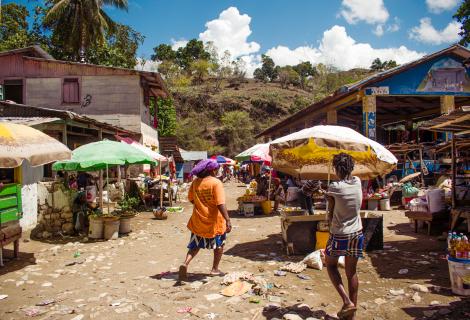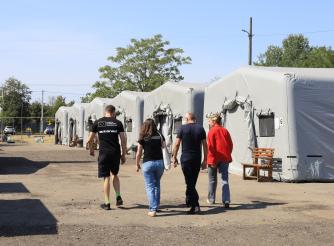2024 was the deadliest year in Haiti’s recent history. We cannot let “Haiti fatigue” set in

By Angeline Annesteus, ActionAid Haiti Country Director
As 2024 draws to a close, Haiti is reeling from what has been the bloodiest year in recent memory. At least 5,000 people have now been killed in gang violence – even more than last year, when homicides doubled. Entire communities were decimated by some of the most violent massacres our nation has ever seen. Just days ago, more than 180 people were brutally murdered by a gang leader in a Port-au-Prince slum called Cité Soleil, in one of Haiti’s worst mass killings in decades.
The horrors faced by women and young girls are particularly chilling. Rape and sexual violence are rampant, and perpetrators act with near-total impunity. Women are attacked in their homes, on the streets and on public transport. Between January and October, more than 5,400 cases of gender-based violence were reported—72% of them involving sexual violence. These figures, already alarming, are likely only a fraction of the true toll.
And yet, the world is looking away. The international spotlight that briefly flickered on Haiti is now dimming. “Haiti fatigue” is setting in. Mass killings barely make news headlines. Aid is dwindling as relentless crises – earthquakes, climate disasters, political upheaval – make governments wary of further investment. Hopes that were pinned on the Kenyan-led police mission are fading as the violence rages on, unchecked and unrelenting.
A war on women and girls
The terror being wrought on women and girls in Haiti demands that we do not look away. When I speak to survivors, they tell me heartbreaking stories of the sexual abuse they face and how powerless they feel to protect their children. Gangs weaponise rape to terrorise communities. Women whose homes have been burned or ransacked are forced into displacement camps where they face deplorable conditions—and further violence.
One 18-year-old mother I spoke to fled her neighborhood seeking safety in a displacement camp. Instead, she was assaulted again. Her words haunt me: “What I’m going through is not human.”
Survivors of violence and abuse need medical care, safe houses and psychological support. But funding for these critical protections has fallen dangerously low. The UN has raised just 42% of the $674 million needed for Haiti’s humanitarian response this year, and only a fraction of that goes toward protecting women and girls. This is a moral failure.
You’ll often hear violence against women described as a “hidden epidemic.” I find such cliches deeply troubling. In Haiti, the rape and torture of women and girls is not “hidden”. It is a deliberate, inhumane tactic of gang warfare. It is painfully visible—and unbearably ignored.
The women and girls I meet every day, too, are not hiding. They are fighters. With support from ActionAid, young girls are using community radio to speak out about their rights. Just last week, 200 displaced women and girls held a sit in to demand the protection of their rights, after an awareness-raising day we held with them. These women are mobilising in their communities and offering hope for a future free from violence. They are the backbone of Haiti, but they cannot do it alone.
No time to wait
The safety of women and girls in Haiti is non-negotiable. As well as stepping up efforts to address the gangs, the international community must prioritise funding for women-led organisations to provide medical care, safe shelters, and justice for survivors of their brutality.
Of course, there will be no end to the horrors faced by Haitian women and girls until there is an end to the gang violence. But, considering the past failures of UN international security and peacekeeping missions in Haiti, the Kenyan-led UN intervention will not offer a solution if it just a short-term remedy and is not backed by a clear, well-funded plan to address the structural causes of violence, in particular, gender-based violence.
With a new year fast approaching, we must ask ourselves what kind of world we are willing to tolerate. Haitian women and girls deserve more than our sympathy. They deserve action. Let us not wait for the next grim milestone before we respond.


